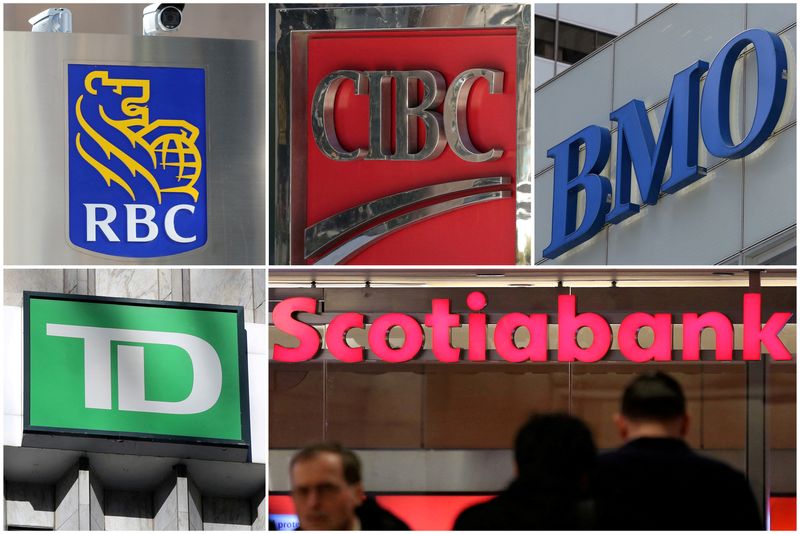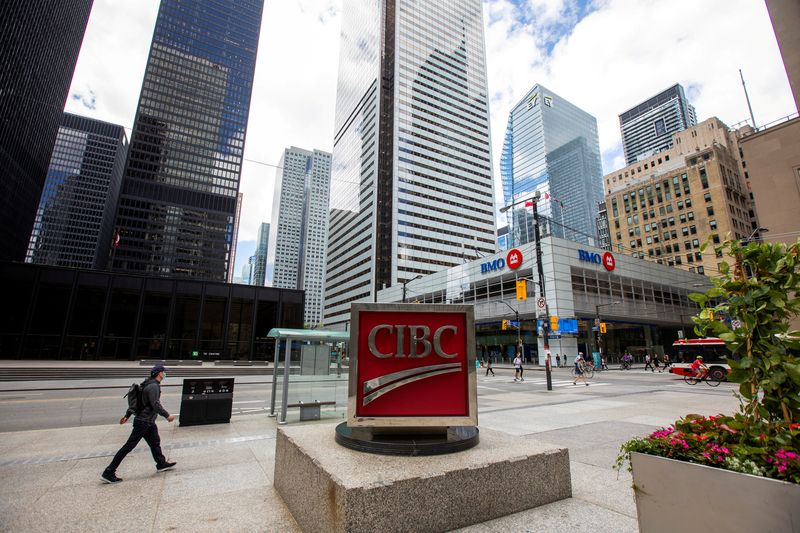By Nivedita Balu
TORONTO (Reuters) - Canadian banks are expected to report a rise in bad debt provisions and highlight risks from commercial property loans when they report earnings this week, with the country's No.2 bank TD in focus after its acquisition of First Horizon (NYSE:FHN) failed.
Bay Street analysts have lowered their second quarter earnings expectations for Canadian banks, anticipating higher expenses and slowing loan growth as turmoil south of the border weighs on the broader banking sector. Still, investors view Canadian banks as safer bets than their U.S. counterparts due to their strong capital levels.
"We believe that cracks in the foundation will become evident," Barclays (LON:BARC) analyst John Aiken said about bank earnings for the second quarter ending April 30.
He expects pressure on the banks' valuations and declining confidence in their earnings outlook.
Aiken, who has lowered his outlook for the sector to 'neutral' from 'positive,' said management commentary around credit and revenue will be front and center in investors' minds.
"Unfortunately, we see more downside risk than upside," he added.
The top banks are expected to report net interest income growth of between 3% and 30% for the second quarter from a year ago, with analysts forecasting Bank of Montreal to be the top performer thanks to its Bank of the West acquisition.
Loan provisions, however, are likely to jump for most of the top banks, and will continue to grow in the third quarter, Refinitiv data showed.
Net income is expected to be a mixed bag, likely rising 5.7% for TD and 7% for BMO, while declining between 6% and 17% for the other four banks.
BMO and Scotia Bank are due to report earnings on Wednesday, while TD, Canadian Imperial Bank of Commerce and Royal Bank of Canada report on Thursday.
Keefe, Bruyette & Wood analyst Mike Rizvanovic projects a 28% increase in provision for credit losses from the prior quarter for the Big Six banks, driven by rising insolvencies and a push to build reserves.
TD's management is expected to face questions from analysts after media reports said the bank's anti-money laundering practices scuttled its $13 billion deal for U.S. lender First Horizon. TD in response said it works to prevent criminals from using the bank for illegal activity and strengthen its risk management programs.
Investors are keen to hear how the lender plans to deploy the estimated $20 billion in excess capital it has.
"The excess capital should alleviate investor concerns on capital adequacy and gives TD optionality once again," CIBC analyst Paul Holden said.
Holden expects TD and National Bank of Canada (OTC:NTIOF) to boost their dividend by about 5%, while the other banks are expected to raise them closer to 3%.
TD is the worst performer among big bank stocks in Canada, falling about 6% so far this year while BMO has lost about 3% in the same time period. RBC, CIBC, National Bank and Scotia Bank have gained between 0.5% and 12%.

Empty offices in big cities have raised concerns among investors about banks' commercial property loan exposure, since about 10% of the lending portfolio of the Big-6 banks is tied to commercial real estate. Occupancy rates hover in the 50% range as more companies opt for a hybrid work model.
The Bank of Canada has also said it is increasingly worried about the ability of households to pay off their debts and is seeing signs of financial stress among some homebuyers.
